Garden Maintenance in Finchley
Introduction to Garden Maintenance
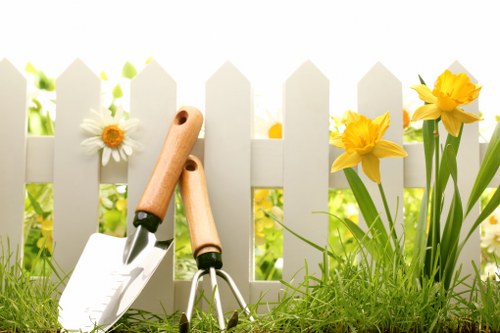
Maintaining a beautiful garden in Finchley requires regular attention and care. Whether you're an avid gardener or a busy homeowner, understanding the essentials of garden maintenance can transform your outdoor space into a lush, vibrant sanctuary.
Garden maintenance involves a variety of tasks, including planting, pruning, weeding, and lawn care. Each of these activities plays a crucial role in ensuring the health and aesthetics of your garden.
In Finchley, the climate and soil conditions present unique challenges and opportunities for gardeners. By tailoring your maintenance practices to the local environment, you can achieve optimal results and enjoy a thriving garden year-round.
Seasonal Garden Maintenance Tasks
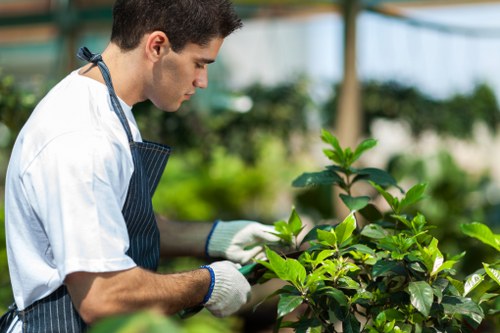
Different seasons demand different maintenance activities to keep your garden in top shape. Here's a breakdown of essential tasks for each season:
Spring
Spring is a time of renewal and growth. It's the perfect season to prepare your garden for the upcoming months.
- Planting: Sow seeds and plant new shrubs and flowers.
- Pruning: Trim dead branches and shape existing plants.
- Soil Preparation: Add compost and mulch to enrich the soil.
Regular spring maintenance sets the foundation for a healthy and vibrant garden throughout the year.
Lawn Care and Maintenance
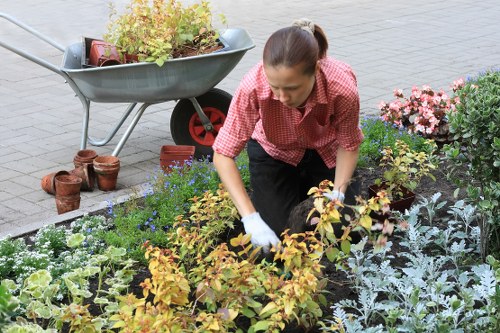
A well-maintained lawn is the centerpiece of any garden. Proper lawn care enhances the overall appearance and provides a lush green carpet for outdoor activities.
Grass Cutting
Regular mowing helps keep the grass at an optimal height, promoting dense and healthy growth.
Watering
Consistent watering is essential, especially during dry spells. Early morning watering reduces evaporation and prevents fungal diseases.
Implementing a proper lawn care regimen ensures a resilient and attractive lawn all year round.
Pruning and Trimming Techniques
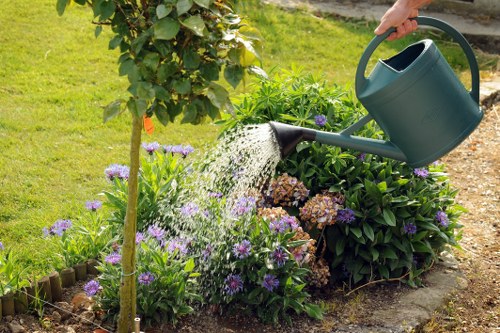
Pruning is a vital aspect of garden maintenance that encourages healthy growth and enhances the beauty of your plants.
Why Prune?
Pruning removes dead or diseased branches, promotes better air circulation, and directs the plant's energy towards new growth.
- Shape Management: Maintain the desired shape and size of your plants.
- Health Improvement: Remove parts of the plant that may harbor pests or diseases.
- Flower and Fruit Production: Enhance the quality and quantity of blooms and harvests.
Mastering pruning techniques can significantly improve the longevity and vitality of your garden plants.
Irrigation and Watering Strategies
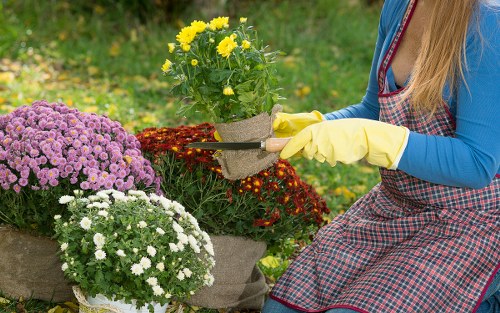
Effective irrigation is critical for maintaining healthy gardens, especially in regions with varying climate conditions like Finchley.
Types of Irrigation Systems
Choosing the right irrigation system can save time and resources while ensuring your garden receives adequate water.
- Drip Irrigation: Delivers water directly to the plant roots, minimizing evaporation.
- Sprinkler Systems: Ideal for covering larger areas like lawns and flower beds.
- Manual Watering: Allows for precise control but requires more effort.
Implementing an efficient watering strategy is essential for sustainable garden upkeep.
Choosing the Right Plants for Finchley Gardens

Selecting plants that thrive in Finchley's climate is fundamental to successful garden maintenance. Consider factors like sunlight, soil type, and water availability when choosing your garden plants.
Perennials vs. Annuals
Perennials offer longevity and require less frequent planting, while annuals provide vibrant seasonal color.
Drought-Tolerant Plants
Incorporating drought-tolerant species can reduce water usage and enhance garden resilience during dry periods.
- Lavender: Adds fragrance and attracts pollinators.
- Hostas: Provide lush foliage in shaded areas.
- Sedum: Offers succulent textures and easy maintenance.
Choosing the right mix of plants ensures a diverse and sustainable garden ecosystem.
Fertilizing and Soil Health

Healthy soil is the foundation of a thriving garden. Proper fertilization and soil management enhance plant growth and productivity.
Types of Fertilizers
Select the appropriate fertilizer based on your soil's nutrient needs. Organic options include compost and manure, while synthetic fertilizers offer targeted nutrient delivery.
Soil Testing
Regular soil testing helps identify nutrient deficiencies and pH imbalances, allowing for precise amendments.
- Nitrogen: Promotes leafy growth.
- Phosphorus: Enhances root development and flowering.
- Potassium: Improves overall plant health and disease resistance.
Maintaining soil health is crucial for sustainable garden growth and longevity.
Garden Design and Landscaping

A well-designed garden not only looks appealing but also serves functional purposes like providing shade, privacy, and habitat for wildlife.
Creating Garden Zones
Divide your garden into different zones based on their use, such as dining areas, relaxation spots, and plant beds.
Hardscaping Elements
Incorporate features like paths, fences, and water elements to add structure and interest to your garden.
- Stone Pathways: Guide visitors through your garden.
- Decorative Fencing: Offers privacy and aesthetic appeal.
- Water Features: Create a calming environment with ponds or fountains.
Thoughtful landscaping enhances both the beauty and functionality of your garden space.
Hiring Professional Garden Maintenance Services in Finchley

For those who prefer expert assistance, hiring professional garden maintenance services in Finchley can ensure your garden remains pristine and healthy.
Benefits of Professional Services
Experienced gardeners bring specialized knowledge and tools to handle various maintenance tasks efficiently.
Choosing the Right Service Provider
When selecting a garden maintenance company, consider their reputation, range of services, and customer reviews.
- Experience: Look for established professionals with a proven track record.
- Services Offered: Ensure they provide the specific maintenance services you need.
- Pricing: Compare quotes to find a service that fits your budget.
Contact us today to discover how our professional garden maintenance services in Finchley can transform your outdoor space.
Lawn and Garden Pests Management

Protecting your garden from pests is essential for maintaining plant health and preventing damage.
Common Garden Pests in Finchley
Be aware of pests like aphids, slugs, and mites that can harm your plants. Early detection and intervention are key to effective management.
Natural Pest Control Methods
Opt for eco-friendly pest control solutions to minimize environmental impact. Methods include introducing beneficial insects, using organic pesticides, and implementing physical barriers.
- Ladybugs: Help control aphid populations.
- Beer Traps: Effective for slug control.
- Nematicides: Target specific soil-dwelling pests.
Implementing integrated pest management strategies ensures a healthy and pest-free garden.
Mulching and Weed Control

Mulching serves multiple purposes, including retaining soil moisture, suppressing weeds, and enhancing the garden's appearance.
Types of Mulch
Choose from organic mulches like wood chips and bark or inorganic options such as gravel and plastic sheeting based on your garden's needs.
Effective Weed Control
Regular weeding is essential to prevent competition for nutrients and water. Mulching can significantly reduce weed growth by blocking sunlight.
- Manual Weeding: Hand-pull weeds to avoid damaging surrounding plants.
- Chemical Herbicides: Use sparingly and opt for environmentally friendly options.
- Preventative Measures: Apply mulch early to minimize weed establishment.
Maintaining a mulched garden not only reduces maintenance efforts but also promotes plant health.
Pruning Trees and Shrubs

Proper pruning of trees and shrubs is essential for their structural integrity and aesthetic appeal.
When to Prune
The best time to prune depends on the plant species. Generally, late winter or early spring is ideal for most trees and shrubs.
Pruning Techniques
- Thinning Cuts: Remove entire branches at the base to reduce density.
- Heading Cuts: Shorten branches to encourage bushier growth.
- Selective Pruning: Target specific areas to shape the plant aesthetically.
Consistent pruning practices ensure the longevity and beauty of your trees and shrubs.
Composting and Sustainable Practices

Incorporating composting and sustainable practices into your garden maintenance routine can enhance soil quality and promote environmental responsibility.
Benefits of Composting
Composting recycles organic waste, enriches the soil with essential nutrients, and reduces the need for chemical fertilizers.
Sustainable Gardening Tips
- Use Native Plants: They require less water and are more resilient.
- Implement Rainwater Harvesting: Collect and use rainwater for irrigation.
- Reduce Chemical Usage: Opt for natural pest control and fertilizers.
Embracing sustainable gardening practices leads to a healthier garden and a greener environment.
Conclusion

Effective garden maintenance in Finchley involves a combination of regular care, appropriate techniques, and sustainable practices. By following the guidelines outlined above, you can enjoy a thriving and beautiful garden throughout the year.
Whether you choose to maintain your garden yourself or hire professional services, investing time and effort into garden upkeep will yield rewarding results.
Book your service now and take the first step towards a stunning outdoor space.
